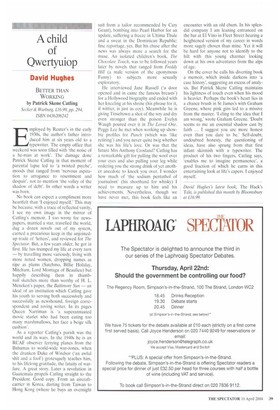A child of Qwertyuiop
David Hughes
BETTER THAN WORKING by Patrick Skene Catling Seeker & Warburg, £16.99, pp. 294, ISBN 0436206242 Fmployed by Reuters in the early 1930s, the author's father introduced him at six years old to a i
typewriter. The empty office that weekend was soon filled with 'the noise of a he-man at work'. The damage done Patrick Skene Catling in that moment of parental lapse led to 'a twisted psyche', moods that ranged from 'nervous aspiration to arrogance to resentment and despair', not to mention 'the valley of the shadow of debt'. In other words a writer was born.
No book can expect a compliment more heartfelt than 'I enjoyed myself.' This may be because, with a trace of reflected vanity, I see my own image in the mirror of Catling's memoir. I too wrote for newspapers, married a star, travelled the world, dug a dozen novels out of my system, earned a precarious keep in the unjoinedup trade of 'letters', and reviewed for The Spectator. But, a few years older, he got in first. He has trumped my life at every turn — by travelling more variously, living with more noted women, dropping names as ripe as plums (Satchmo, Billie Holiday, Mitchum, Lord Montagu of Beaulieu) but happily describing them in thumbnail sketches more than worthy of H. L. Mencken's paper, the Baltimore Sun — an ideal of an institution which Catling gave his youth to serving both successively and successfully as newshound, foreign correspondent and roving writer. In its pages Queen Narriman is 'a superannuated movie starlet who had been eating too many marshmallows, her face a beige silk cushion'.
As a reporter Catling's parish was the world and its wars. In the 1940s he is an RCAF observer ferrying planes from the Bahamas to world-wide war-zones, when the drunken Duke of Windsor ('an awful shit and a fool') grotesquely teaches him, to his lifelong gratitude, the fatuity of warfare. A great story. Later a revolution in Guatemala propels Catling straight to the President. Good copy. From an aircraftcarrier in Korea, darting from Taiwan to Hong Kong (where he buys an overnight
suit from a tailor recommended by Cary Grant), bombing into Pearl Harbor for an update, suffering a freeze in Ultima Thule and a sweat in the Dominican Republic: fine reportage, yes. But his chase after the news was always more a search for the muse. An isolated children's book, The Chocolate Touch, was to be followed years later by novels that ranged from Freddy Hill (a male version of the eponymous Fanny) to subjects more sexually exploratory.
He interviewed Jane Russell ('a door opened and in came the famous breasts') for a Hollywood biography and ended with her kneeling at his shrine (his phrase for it, if wittier, is just as coy). Meanwhile he is giving Tinseltown a shot of the wry and dry even stronger than the poison Evelyn Waugh poured over it in The Loved One. Peggy Lee he met when working up showbiz profiles for Punch (which was 'like retiring') and you never quite twig whether she was his life's love. Or was that the future Mrs Anthony Crosland? Catling has a remarkable gift for pulling the wool over your eyes and also pulling your leg while ordering you the strong drink of yet another anecdote to knock you over. I wonder how much of 'the sodium pentathol of journalism' (his shorthand for whisky) I need to measure up to him and his achievements. Nevertheless, though we have never met, this book feels like an encounter with an old chum, In his splendid company I am leaning entranced on the bar at El Vino in Fleet Street hearing a heightened version of my career in words more sagely chosen than mine. Yet it will be hard for anyone not to identify to the hilt with this young charmer looking down at his own adventures from the alps of age.
On the cover he calls his diverting book a memoir, which inside darkens into 'a case history', suggesting an excess of analysis. But Patrick Skene Catling maintains his lightness of touch even when his mood is heavier. Perhaps the book's heart lies in a chance brush in St James's with Graham Greene, where pink gins led to a missive from the master. '1 cling to the idea that I am wrong,' wrote Graham Greene. 'Doubt seems to me an essential shadow cast by faith ... I suggest you are more honest even than you dare to be.' Self-doubt, undoubted honesty, the questioning of ideas, have also sprung from that first infant skirmish with a typewriter. The product of his two fingers, Catling says, 'enables me to imagine permanence', a good fraction of which he earns in this entertaining look at life's capers. I enjoyed myself.
David Hughes's latest book, The Hack's Tale, is published this month by Bloomsbuty at £16.99.


































































 Previous page
Previous page